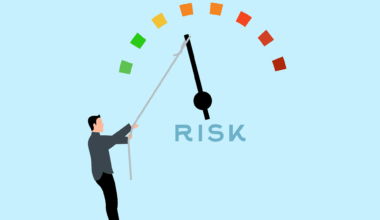The Influence of Geopolitical Tensions on International Financial Institutions
Geopolitical tensions significantly affect international financial institutions, impacting global markets and economic stability. Institutions such as the IMF, World Bank, and regional development banks find their operations influenced by international relations. Heightened tensions can lead to increased uncertainty in global markets, adversely impacting investment and trade flows. Countries involved in conflicts often see their currencies fluctuate wildly. This affects both their credit ratings and the ability to secure loans. Moreover, the rivalry between nations can also lead to sanctions that isolate economies from global financial systems. These sanctions can hinder foreign direct investment, stalling growth and leading to economic downturns. Financial institutions must adapt to these shifting dynamics to maintain stability. Moreover, geopolitical risks are analyzed in terms of potential growth opportunities in emerging markets. Countries under geopolitical strain might pursue reforms or privatization to attract investment, thus presenting opportunities for international investors. Therefore, keeping abreast of geopolitical risks is a vital strategy for financial institutions to manage portfolios effectively. Institutions regularly publish reports on these risks to guide investor decision-making and to better navigate the global landscape.
Economic Implications of Geopolitical Instability
The economic implications of geopolitical instability reach far beyond immediate financial market reactions. When tensions escalate, so too does the potential for regional economic disruptions. Supply chains may be disrupted, leading to shortages and inflation. For example, conflicts that affect oil-rich regions can cause spikes in energy prices, broadly impacting economies dependent on fuel imports. Financial institutions must account for these variables when assessing risk. The interconnectedness of today’s global economy means that instability in one region can ripple across the globe. Routine assessments of geopolitical risks allow institutions to recalibrate their investment strategies accordingly. Diversification becomes crucial in managing exposure to volatile regions while seeking out stable investments elsewhere. The fear of instability can lead to capital flight, where investors withdraw their funds from perceived risky markets. This reaction can further exacerbate economic challenges in those areas, creating a vicious cycle of decline. Additionally, international financial regulation can be influenced by geopolitical dynamics, altering how institutions operate across borders. Regulatory frameworks may tighten or loosen based on the prevailing political climate, affecting the operational landscape for global financial players.
As international financial institutions navigate these complex waters, they must also consider the legal and ethical ramifications of their actions. Engaging in markets with high geopolitical risk can expose institutions to reputational dangers. Lending to countries under sanctions or in conflict can attract scrutiny not only from regulators but also from the public. Therefore, ethical considerations have become paramount in the decision-making process of these institutions. Institutions now implement compliance programs to ensure adherence to legal requirements and to mitigate risks associated with their investments. Moreover, due diligence practices are evolving, emphasizing the need for transparency in operations. By fostering sustainable and ethical investment, institutions can weather geopolitical storms better than those who do not. Developing countries under geopolitical threat also seek to prove their viability to investors by enhancing governance and regulatory quality. International financial institutions can play a pivotal role in this transformation. By providing technical assistance and guidance, they can help stabilize these economies. Thus, the interplay between globalization, ethical investing, and geopolitical risks shapes the landscape for financial institutions making critical decisions.
The Role of Risk Assessment in Investment Strategies
Risk assessment forms the backbone of investment strategies in the context of geopolitical tensions. Financial institutions prioritize analytical frameworks that evaluate geopolitical risks alongside traditional market factors. It is essential for investment committees to integrate geopolitical analysis into overall portfolio management. Regularly updated assessments allow institutions to respond proactively to emerging threats. These assessments also help identify potential growth opportunities in less-traditional markets, where investors might otherwise show hesitation. Many institutions employ geopolitical analysts who specialize in monitoring developments worldwide, providing insights into regional dynamics. By anticipating risks, they can offer timely advice on portfolio adjustments that hedge against volatility. Moreover, advanced modeling techniques help in quantifying risks associated with specific investments. Institutional investors benefit from these data-driven insights, enhancing their decision-making processes. Furthermore, collaboration with think tanks and research bodies enriches the understanding of geopolitical developments. Financial institutions must navigate these uncertain waters with a nuanced approach, balancing risk and reward effectively. Ultimately, improved sophistication in risk assessment translates into more robust investment strategies, equipping institutions to thrive amidst perpetual geopolitical turbulence.
The increasing interdependence between markets and politics signifies a shift in how financial institutions view their responsibilities. Stakeholders, including investors and consumers, increasingly expect these institutions to be proactive regarding geopolitical issues. Institutions are now expected to engage in discussions about sustainable development and responsible investment. This includes understanding how geopolitical factors affect local communities and long-term economic stability. As such, a growing trend is emerging, where financial institutions take on a more significant role in promoting peace and stability. By investing in conflict resolution and supporting development initiatives, they can foster positive change in volatile regions. This presents an opportunity for institutions to align their goals with broader societal objectives. Additionally, reporting practices have evolved to include metrics that measure the impact of investments on geopolitical stability. More transparency fosters trust among investors and the public. It demonstrates a commitment to social responsibility, integrating ethical investment strategies that acknowledge geopolitical complexities. Thus, financial institutions are not only focusing on profits but also considering their impact on global peace and economic development, setting a new standard in financial governance.
Case Studies of Geopolitical Risk Management
Case studies of geopolitical risk management among leading financial institutions reveal valuable lessons. For instance, during the Arab Spring, many institutions reevaluated their exposure to the Middle East. Those that acted swiftly to mitigate risk found pathways to maintain stable returns. Early assessments indicated possible market fluctuations, prompting preemptive portfolio adjustments. In contrast, institutions that remained passive faced considerable losses. These examples underline the importance of agile strategies in crisis management, underscoring the role of proactive measures. Another case involves the recent tensions between the U.S. and China, greatly impacting markets worldwide. Institutions that diversified their holdings to reduce dependency on any one region demonstrated resilience amid uncertainties. Additionally, navigating international trade disputes required adaptive strategies ensuring compliance while maximizing opportunities. Risk assessment has proved crucial in these scenarios, enabling institutions to adjust their focuses swiftly. Moreover, insights from geopolitical analysts during these turbulent times provided guidance that many institutions found invaluable. These case studies highlight that financial institutions must continuously evolve their strategies, emphasizing the need for effective geopolitical risk management to survive and thrive.
As global leaders navigate intricate dynamics, the roles of international financial institutions will continue to evolve. Collaboration among nations will be increasingly pivotal in facilitating dialogues on mitigating geopolitical risks. By fostering a cooperative approach, these institutions can actively participate in broader policy discussions. This shift urges institutions to move beyond mere financial returns toward comprehensive strategies that incorporate social and political considerations. The financial sector is uniquely positioned to influence sustainable development goals and promote stability through targeted investments. Furthermore, with technology enhancing communications, institutions have unprecedented access to real-time data on geopolitical developments. This enables them to conduct more accurate assessments. Social media and big data analytics have become integral tools in understanding public sentiment regarding geopolitical issues, impacting investment decisions. Financial institutions, recognizing the long-term implications of their actions, will not only steer clear of conflict risks but will also support countries toward resilience. Evolving perspectives on the role of finance underscore the transformative power that institutions hold in championing peace and stability, showcasing that profits and principles can align in meaningful ways in the face of geopolitical tensions.


